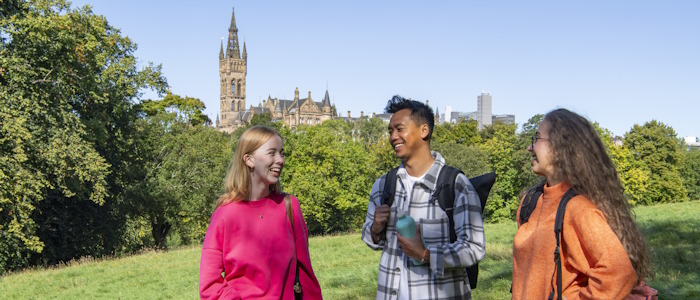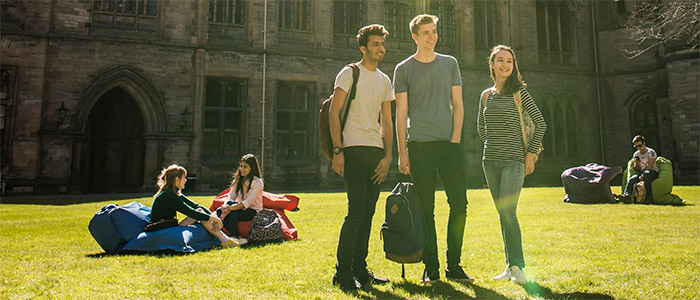Spanish MA

Spanish is the second most widely spoken language in the world and is an official language in more than 20 countries.
Staff in Glasgow cover a wide range of topics and you will have the opportunity to work with native speakers from different parts of the Spanish-speaking world.
- September start
- Session dates
- Spanish MA (Hons): R410 5 year degree
- Glasgow: Gilmorehill campus
- Degree options
- Study abroad available
School of Modern Languages & Cultures 2024
Programme structure
Year 1
The course you study in first year depends on how much Spanish you have studied before. If you have an SQA Higher or A-level in Spanish (grade A or B), you will take Spanish language and Spanish culture. You will study some of the cultures of Spain and Latin America through a variety of topics, texts and films.
If you are a beginner or near-beginner and have some previous language learning experience, you can take the level 1 beginners’ course, which provides an intensive foundation in reading, writing and speaking Spanish.
Year 2
In year 2 you will extend your linguistic skills and build your knowledge of Spanish and Latin American culture. Students progressing from the first-year beginners’ course normally study additional cultural materials.
You will also study other subjects in years 1 and 2: see Flexible degrees.
Year 3 (year abroad)
If you progress to Honours you will spend year 3 abroad, usually as a language assistant in Spain or Latin America, on a placement arranged through the British Council, or as a student at a university in a Spanish-speaking country, which can include Latin America.
The year abroad is an exciting part of every degree in languages and allows you time to immerse yourself in the language and culture you are studying. The year abroad is also highly valued by employers as it shows them you are a resourceful and adaptable person who embraces new challenges.
For students taking degrees involving languages, you will spend your third year abroad gaining credit either by:
- studying at a partner university
- working as an English Language Assistant in a school within Europe (British Council scheme)
- a work placement arranged independently, approved by the School of Modern Languages & Cultures.
If you study two languages, you will spend your year abroad in a country where one of the two languages you are studying is spoken and you’ll spend another three months abroad in your fourth year, which will allow you to go to a country where your second language is spoken.
Members of staff in each subject and in the University’s international office are on hand to support students with residence abroad.
Years 4 and 5
You will take Spanish as a core language and select courses from a wide range of linguistic, literary, cultural and historical topics.
Degree structure for Non Beginners Languages
Degree structure for Beginners Languages
Course details
Programme alteration or discontinuation
The University of Glasgow endeavours to run all programmes as advertised. In exceptional
circumstances, however, the University may withdraw or alter a programme. For more information,
please see: Student contract.
Entry requirements
for entry in 2025
You should refer to the entry requirements for both subjects and the degree award when applying for a joint honours degree programme. The higher entry requirement (where applicable) and additional requirements must be met for both subjects.
Summary of entry requirements for Spanish
SQA Higher entry requirements
- BBBB is the minimum requirement from S5 to be reviewed for an S6 offer
- Offers are not guaranteed to applicants who meet the minimum from S5
- Typically offers will be made at AAAAA by end of S6. B at Advanced Higher is equivalent to A at Higher
- Additional requirements: Higher English and a Higher Humanities subject at AA. (AB or BA may be considered).
SQA Higher adjusted entry requirements* (by end of S5 or S6)
- MD20: BBBB (also other target groups*)
- MD40: AABB*
- Additional requirements: Higher English and a Higher Humanities subject. Successful completion of Top-Up or one of our Summer Schools.
* See Access Glasgow for eligibility.
A-level standard entry requirements
- AAB – BBB
- Additional requirements: one A-level Humanities subject.
IB standard entry requirements
- 34 (6,5,5)
- Additional requirements: English HL6 or Humanities HL6 with English SL6.
Note: No prior knowledge of Spanish is required
Entry requirements for advanced entry to Spanish
Applicants who achieve exceptional grades in their Advanced Highers, A-levels or International Baccalaureate may be considered for advanced entry, meaning that an Honours degree can be completed in three years instead of the normal four years, or four years for five-year integrated Masters programmes. Not all joint honours subjects are available for advanced entry and applications to joint honours programmes will be considered on a case-by-case basis.
Choose point of entry 2nd year on your UCAS application to indicate you wish to be considered for advanced entry.
SQA Higher requirements for advanced entry
- Three Advanced Highers at Grades AAA attained in one exam year and at the first attempt. Subjects must be relevant to the courses to be taken at Level 2.
A-Level requirements for advanced entry
- A*A*A
IB requirements for advanced entry
- 38 points
Admissions guidance
English language
For applicants from non-English speaking countries, as defined by the UK Government, the University sets a minimum English Language proficiency level.
English language requirements
Career prospects
Language graduates go into a whole host of careers including:
- media
- arts organisations
- education / teaching
- fast stream civil service
- banking
- management
- public relations
- diplomatic service.
Employers really value the transferable skills you gain during a degree in languages. A degree from the School of Modern Languages & Cultures will enable you to look at the world in a different way.
Degrees and UCAS codes
When applying you will need to know the UCAS code for the subject or subject-combination that you wish to apply to:
MA (Hons)
Fees and funding
Tuition fees
How and when you pay tuition fees depends on where you’re from: see Tuition fees for details.
Scholarships
The University is committed to supporting students and rewarding academic excellence. That's why we've invested more than £1m in additional scholarship funding in recent years.
World Changers Global Excellence Scholarship
World Changers Glasgow Scholarship UG (EU)
World Changers RUK Excellence Scholarship
World Changers RUK Access Bursary
James McCune Smith Undergraduate Scholarship
Care Experienced and Estranged Student Bursary
Beatrix Whistler and James McNeill Whistler Scholarship
Beaconhouse Schools
Undergraduate Talent Scholarships
Cowrie Foundation Scholarship
The Clan Gregor Society Prize
The Dima Alhaj Scholarship
Sanctuary Scholarships
Travel Bursary for Forced Migrants
Glasgow Highland Society Scholarship
The scholarships above are relevant to this programme. For more funding opportunities search the scholarships database
How to apply
Full-time students must apply through the Universities & Colleges Admissions Service (UCAS).
SQA applicants who are eligible for our Widening Participation programmes are encouraged to participate in one or more of these programmes, including Summer School, to support your application and the transition to higher education.
International students to Arts, Engineering, Law, Nursing, Science, and Social Sciences can also apply using The Common Application: however, if applying to more than one UK university, we recommend using UCAS. Applications to Dentistry, Education, Medicine, and Veterinary Medicine must be made through UCAS.
Application deadlines
- 15 October: if including Dentistry, Medicine, Veterinary Medicine or also applying to Oxford or Cambridge
- 29 January: all other UK applicants (unless otherwise stated on the UCAS website)
- 30 June: international students.
We do not usually accept any applications after these deadlines.
It's your responsibility to ensure the accuracy of your application before submission. Requests to correct application content, change degree programme or change college of entry, will not be accepted after these deadlines. This policy is in place to ensure fairness and consistency to all applicants, and no exceptions will be made.
- Apply at www.ucas.com or through your school or college
- Contact UCAS on 0871 468 0468
- Apply at commonapp.org (international students to certain areas only)
How to apply for Advanced Entry
Apply for year 2 (Y2) on your UCAS application. If the specific subject is unavailable for Advanced Entry or your application for year 2 entry is unsuccessful, you will be automatically considered for year 1 entry. You do not have to submit a separate UCAS application.





